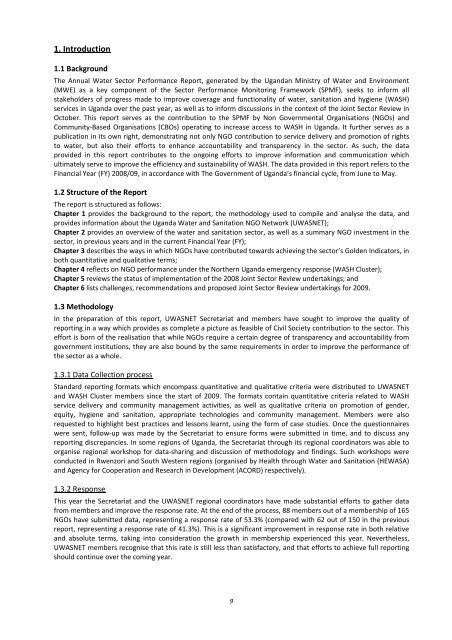Download to Read More - UWASNET
Download to Read More - UWASNET
Download to Read More - UWASNET
You also want an ePaper? Increase the reach of your titles
YUMPU automatically turns print PDFs into web optimized ePapers that Google loves.
1. Introduction<br />
1.1 Background<br />
The Annual Water Sec<strong>to</strong>r Performance Report, generated by the Ugandan Ministry of Water and Environment<br />
(MWE) as a key component of the Sec<strong>to</strong>r Performance Moni<strong>to</strong>ring Framework (SPMF), seeks <strong>to</strong> inform all<br />
stakeholders of progress made <strong>to</strong> improve coverage and functionality of water, sanitation and hygiene (WASH)<br />
services in Uganda over the past year, as well as <strong>to</strong> inform discussions in the context of the Joint Sec<strong>to</strong>r Review in<br />
Oc<strong>to</strong>ber. This report serves as the contribution <strong>to</strong> the SPMF by Non Governmental Organisations (NGOs) and<br />
Community-Based Organisations (CBOs) operating <strong>to</strong> increase access <strong>to</strong> WASH in Uganda. It further serves as a<br />
publication in its own right, demonstrating not only NGO contribution <strong>to</strong> service delivery and promotion of rights<br />
<strong>to</strong> water, but also their efforts <strong>to</strong> enhance accountability and transparency in the sec<strong>to</strong>r. As such, the data<br />
provided in this report contributes <strong>to</strong> the ongoing efforts <strong>to</strong> improve information and communication which<br />
ultimately serve <strong>to</strong> improve the efficiency and sustainability of WASH. The data provided in this report refers <strong>to</strong> the<br />
Financial Year (FY) 2008/09, in accordance with The Government of Uganda’s financial cycle, from June <strong>to</strong> May.<br />
1.2 Structure of the Report<br />
The report is structured as follows:<br />
Chapter 1 provides the background <strong>to</strong> the report, the methodology used <strong>to</strong> compile and analyse the data, and<br />
provides information about the Uganda Water and Sanitation NGO Network (<strong>UWASNET</strong>);<br />
Chapter 2 provides an overview of the water and sanitation sec<strong>to</strong>r, as well as a summary NGO investment in the<br />
sec<strong>to</strong>r, in previous years and in the current Financial Year (FY);<br />
Chapter 3 describes the ways in which NGOs have contributed <strong>to</strong>wards achieving the sec<strong>to</strong>r’s Golden Indica<strong>to</strong>rs, in<br />
both quantitative and qualitative terms;<br />
Chapter 4 reflects on NGO performance under the Northern Uganda emergency response (WASH Cluster);<br />
Chapter 5 reviews the status of implementation of the 2008 Joint Sec<strong>to</strong>r Review undertakings; and<br />
Chapter 6 lists challenges, recommendations and proposed Joint Sec<strong>to</strong>r Review undertakings for 2009.<br />
1.3 Methodology<br />
In the preparation of this report, <strong>UWASNET</strong> Secretariat and members have sought <strong>to</strong> improve the quality of<br />
reporting in a way which provides as complete a picture as feasible of Civil Society contribution <strong>to</strong> the sec<strong>to</strong>r. This<br />
effort is born of the realisation that while NGOs require a certain degree of transparency and accountability from<br />
government institutions, they are also bound by the same requirements in order <strong>to</strong> improve the performance of<br />
the sec<strong>to</strong>r as a whole.<br />
1.3.1 Data Collection process<br />
Standard reporting formats which encompass quantitative and qualitative criteria were distributed <strong>to</strong> <strong>UWASNET</strong><br />
and WASH Cluster members since the start of 2009. The formats contain quantitative criteria related <strong>to</strong> WASH<br />
service delivery and community management activities, as well as qualitative criteria on promotion of gender,<br />
equity, hygiene and sanitation, appropriate technologies and community management. Members were also<br />
requested <strong>to</strong> highlight best practices and lessons learnt, using the form of case studies. Once the questionnaires<br />
were sent, follow-up was made by the Secretariat <strong>to</strong> ensure forms were submitted in time, and <strong>to</strong> discuss any<br />
reporting discrepancies. In some regions of Uganda, the Secretariat through its regional coordina<strong>to</strong>rs was able <strong>to</strong><br />
organise regional workshop for data-sharing and discussion of methodology and findings. Such workshops were<br />
conducted in Rwenzori and South Western regions (organised by Health through Water and Sanitation (HEWASA)<br />
and Agency for Cooperation and Research in Development (ACORD) respectively).<br />
1.3.2 Response<br />
This year the Secretariat and the <strong>UWASNET</strong> regional coordina<strong>to</strong>rs have made substantial efforts <strong>to</strong> gather data<br />
from members and improve the response rate. At the end of the process, 88 members out of a membership of 165<br />
NGOs have submitted data, representing a response rate of 53.3% (compared with 62 out of 150 in the previous<br />
report, representing a response rate of 41.3%). This is a significant improvement in response rate in both relative<br />
and absolute terms, taking in<strong>to</strong> consideration the growth in membership experienced this year. Nevertheless,<br />
<strong>UWASNET</strong> members recognise that this rate is still less than satisfac<strong>to</strong>ry, and that efforts <strong>to</strong> achieve full reporting<br />
should continue over the coming year.<br />
9



